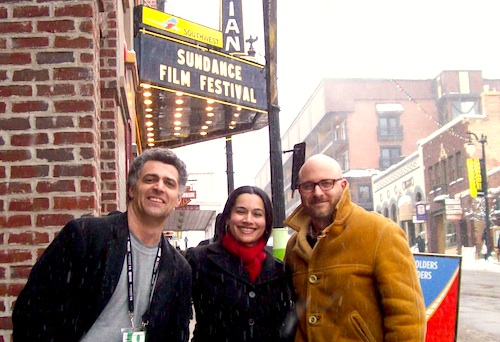
By Govindini Murty. Sundance sets the tone for the entire film industry in North America. Its spirit of supporting creativity, talent, and scrappy innovation is one we heartily applaud here at Libertas. We also applaud the fact that in recent years Sundance has become a home to so many pro-freedom films. To name just a few, these have included Mads Brügger’s daring expose of North Korean Communism The Red Chapel (2010), Chris Morris’ brilliant satire of Islamic terrorism Four Lions (2010), and Lee Tamahori’s intense anti-Saddam Hussein thriller The Devil’s Double (2011).
The 2012 Sundance Film Festival continued this tradition. Pro-freedom films screened at the festival included: Ai Weiwei: Never Sorry, about dissident Chinese artist Ai Weiwei’s efforts to expose the brutality of the Communist Chinese government; The Other Dream Team, about the Lithuanian basketball team and their struggle to overcome Soviet influence; Putin’s Kiss, about the turn toward authoritarianism amongst the Nashi youth movement in Putin’s Russia; and Mads Brügger’s The Ambassador, a witty and politically-incorrect expose of corruption in central Africa. There were also a host of entertaining and well-made narrative dramas and comedies this year. A few we at Libertas enjoyed included The Raid, Grabbers, and Shadow Dancer.
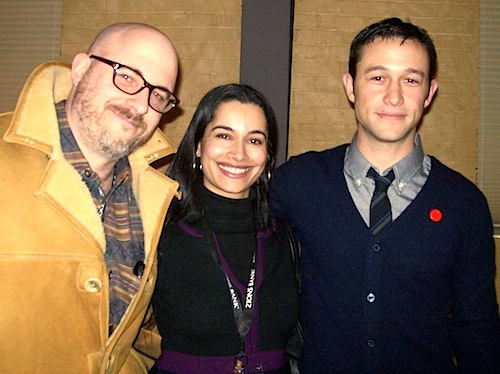
Jason and I arrived at Sundance on Monday, January 23rd. Libertas super-contributor Joe Bendel had already been at the festival since opening night on January 19th, and had managed to fit in an astounding number of films that first weekend. Because we admire the Zen warrior-monk focus Joe brings to writing movie reviews, the first thing we did when we arrived in Park City was meet up with Joe on Main Street – the central artery through which all things Sundance flow. Snow flakes were falling and the lights were twinkling on the picturesque street as we all met up in front of the famed Egyptian Theatre.
Slipping and sliding through the snow and invigorated by the air of good cheer around us, we headed with Joe down the street through the crush of festival goers and filmmakers to plan our film-going strategy. With approximately 180 films showing at Sundance, many playing simultaneously in multiple venues, careful coordination is integral to having a successful Sundance experience. As we hurried down Main Street, we ran into Paul Giamatti (looking avuncular with a fuzzy beard), and Jason spotted Kate Bosworth (there promoting her thriller Black Rock). Jason wanted to ask her whether she did her own surfing in Blue Crush, then thought better of it.
The first Sundance film we had scheduled for that night was an 11:45pm screening of Grabbers – a campy, sci-fi Irish alien-invasion movie. Sundance’s Park City at Midnight screenings are where the festival shows its genre films, and the raucous crowds that attend these screenings often provide a lively show of their own. The screening of Grabbers was great fun, with the mostly drunken crowd hooting and hollering throughout the screening, and we agreed the film had a good chance at getting distribution. In fact, Jason spotted some distribution execs he recognized walking into the theater. We would have stayed for the Q & A with the filmmakers, but it was 2:00am and we were scheduled to attend the coffee chat with Stan Lee at 9:00 the next morning. This was something we would have to get used to at Sundance: sleep deprivation.

Tuesday, January 24th’s highlights were most definitely Slamdance’s two-hour coffee chat with Stan Lee in the morning, followed by the screening of his film With Great Power: The Stan Lee Story that afternoon. Slamdance is the fun, ‘alternative’ festival to Sundance, and is really worth a visit. Jason has already described this wonderful event with Stan Lee in detail, but let me just add how charming, witty, and delightful Stan is in person. He was truly gracious when we met him, with a big smile on his face and a roguish twinkle in his eye. We bonded with him over our mutual love of classic film and all things Errol Flynn, and had fun asking him questions about his work and inspiration during the course of the two-hour master class/coffee chat. We would have loved for Joe to have attended this event with us, but Joe was scheduled to leave Sundance Tuesday morning for New York, so we bid him adieu the night before.
Wednesday, January 25th’s highlights included seeing the IRA-drama Shadow Dancer at the Marc theatre. I had the chance to ask director James Marsh and star Andrea Riseborough (of Madonna’s W.E.) about the film’s political implications, and also how they had conceived of Riseborough’s character (covered in my review here). Riseborough in person is very pretty, warm, and engaging, and she goes through quite a transformation to play a hardened IRA operative in the film. Shadow Dancer is getting positive buzz at the Berlin Film Festival right now (Clive Owen and Gillian Anderson are also in the film, and the entire cast is terrific) and it has been picked up for distribution by Paramount.
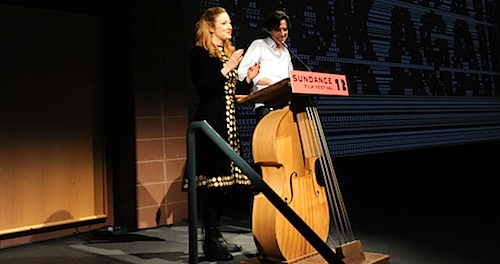
Then in the afternoon Jason and I saw 1/2 Revolution, a striking documentary about the Egyptian revolution – shown, appropriately enough, at the historic Egyptian Theatre on Main Street in Park City. The film was an intense, visceral experience, and received a standing ovation from the crowd. Before the screening began, the filmmakers recited a poem in honor of the Egyptian revolution (which had commenced one year ago that day on January 25th, 2011). The Q & A afterward was a colorful experience. As I describe in my review of the film, a self-described “communist” got up in the audience and announced to the filmmakers that she too was trying to incite a revolution in America. The filmmakers asked her “What kind of revolution?” to which she answered “A communist revolution.” There was an awkward silence, followed by a few snickers. It was interesting to observe that the Sundance audience didn’t cheer the young lady’s call for communist revolution – but instead actually laughed at it. I was also gratified that co-director Karim El Hakim told the woman that Egypt had already had its experience with socialism when it was allied with the Soviet Union, and that it didn’t need to go back to that. When I got up to ask the filmmakers my question, I thanked El Hakim for acknowledging that socialism was a failed ideology that Egypt didn’t need, and then I asked him his thoughts on the rise of the Muslim Brotherhood and the decline of secular liberalism in Egypt.
After the screening, as Jason and I chatted further with El Hakim about the film (he made some interesting comments about what he felt was media misreporting on Egypt), the “communist” came up to us and attempted to hand us some pamphlets, assuring us that we didn’t know the truth about communism. We told her that we very much did know the truth – and that we weren’t interested in what she was peddling. She persisted, so Jason took her aside and informed her that he had actually been to the Soviet Union in the ‘80s, had known Soviet dissidents like Yevgeny Yevtushenko, was friends with Ukrainian Jews who had been exiled to Siberia by the Soviets for being Jewish, and had seen the destructive effects of communism first-hand. Like a good communist, she then disputed whether Jason had really been to the Soviet Union at all – asking him the dates that he had been there! So Jason gave her the dates, smiled at her, then told her she was a loser and should stop reading Chomsky.
We returned to our conversation with the filmmaker, but as the communist kept trying to insert herself into the discussion, I finally had to tell her firmly: “We’ll listen to this filmmaker because he’s just lived through a revolution – but we’re not going to listen to you.” Later on, as we left, she was still chasing the filmmaker out of the theater with her communist pamphlets. He didn’t seem interested.
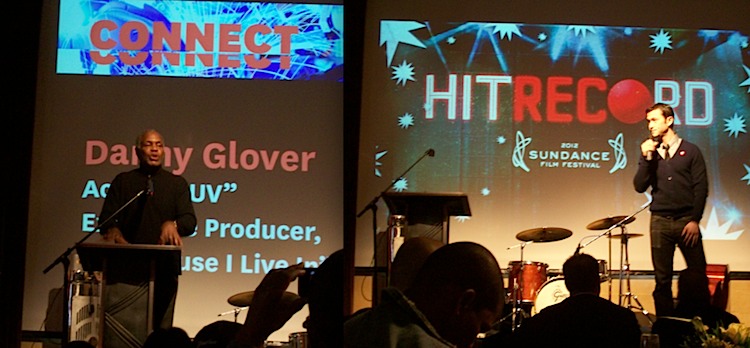
Highlights on Thursday, January 26th included the screening of Mads Brügger’s brilliant film The Ambassador at the Yarrow Hotel Theater. The film received an enthusiastic reception, with one young African-American woman standing up and telling Brügger that he had captured today’s Africa perfectly. We met Mads after the screening and discussed our interview with him for the next day.
Then Jason and I raced off through the beginnings of a gentle snow fall to the 2012 Sundance Business + Technology Connection luncheon. With our gracious hostess Gretchen Brooks, we sat with a group of high-tech CEOs, CTOs, tech investors, and digital filmmaking execs and listened to a distinguished roster of speakers discuss business, film, and technology. Jason also had a delightful run-in with actor Danny Glover, whom Jason first met years ago as a teenager on the set of Lethal Weapon – where Jason’s job was to pick up Danny and Mel Gibson’s spent bullet casings. (A very busy job.) Danny gave Jason a big smile and a huge handshake, nearly breaking Jason’s hand.
At the luncheon we listened to an interesting lineup of speakers: first up was Utah Governor Gary Herbert (Republican), who spoke about the benefits of doing business in Utah. Then Danny Glover gave a warm and heartfelt speech about the importance of storytelling. Adobe CEO John Warnock discussed the power of technology to support creativity – followed by Jamie Redford, son of Robert Redford and an indie filmmaker himself, who discussed his family’s commitment to Utah and Sundance. Last but not least, actor Joseph Gordon-Levitt gave the day’s most dynamic presentation about his online creative venture Hit Record, screening a short film that was collaboratively made online by some of Hit Record’s roster of 70,000+ artists, and narrated by Gary Oldman. We chatted with Joseph Gordon-Levitt after his presentation and found him to be an energetic and quick-witted guy; we also met some interesting indie film producers, talked with the Sundance Institute leadership, and met the genial Swiss Consul General to the Western U.S., Julius Anderegg. I chatted with Mr. Anderegg about such famous Swiss residents as Carl Jung, Thomas Mann, and Jean-Luc Godard – although Jason spent most of the time debating with him whether Roger Federer was actually any better than Pete Sampras.
Friday was our last day at Sundance. The day dawned sunny and bright as we headed off for our interview with filmmaker Mads Brügger. We met up with Mads at Sundance House hosted by Hewlitt-Packard in the Kimball Arts Center. Loping down Main Street from another interview, Mads was instantly recognizable sporting dark shades, and of course, smoking a cigarette. We took some photos outside, and he told us a funny story about a Japanese TV crew that had made him redo his initial greeting with them fifteen times for the camera, since apparently first meetings are very important in Japan. I asked Mads where his leather Ambassador riding boots were, and he apologetically indicated that they had taken up too much room in his suitcase and that he had had to leave them at home.
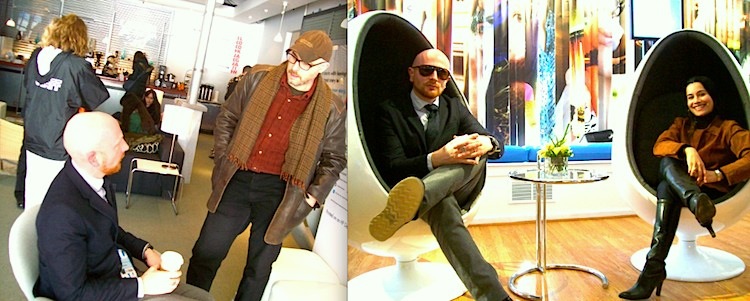
There was so much to discuss with Mads (and he is quite articulate) that we wound up chatting for almost an hour and a half. Before he left, we took some fun photos of Mads sitting in an avant-garde egg-shaped chair. As we photographed him, word spread that an award-winning filmmaker was present. Pretty soon a circle of paparazzi had formed around Mads wanting to take his picture, Hewlitt-Packard staffers started asking him to pose in front of their corporate logo, and enthusiastic fans began to pepper him with questions about his films. Before the frenzy got out of control, Jason and I hustled Mads out of there and he bid us a cheerful farewell as he set off through the snow for his next Ambassador screening – cigarette in hand.
After that it was one final trip up Main Street as Jason and I took some final photos and video in front of the Egyptian Theatre and checked out some other Sundance venues. A great spot to stop (say that five times quickly) was the Sundance Channel HQ, where we enjoyed a tasty lunch courtesy of Chase Sapphire (at Sundance there apparently is such a thing as a free lunch). We sat and watched as Rashida Jones (daughter of Quincy Jones, there promoting her film Celeste and Jesse Forever) and Elijah Wood (of Lord of the Rings, also in Celeste and Jesse Forever) were interviewed in the Sundance Channel studios. After smiling staffers offered us literature and corporate merchandise, we headed out the door for one last look at Main Street before saying goodbye to Sundance and Park City. We want to thank Gretchen Brooks, Maureen Casey-McKeever, Marlin McKeever, and all the Sundance filmmakers and staff we met, for making Sundance 2012 such a special and inspiring experience.
Posted on February 14th, 2012 at 3:42pm.
While I admit I haven’t been keeping up with all the coverage, plus I have no dog in this particular fight, I just wanted to say it’s so nice to see a right-leaning website take Sundance seriously, unlike certain other sites that loves to thumb their noses at such “elitist” events.
Keep up the good work!
Thanks very much, Scott! We certainly will.